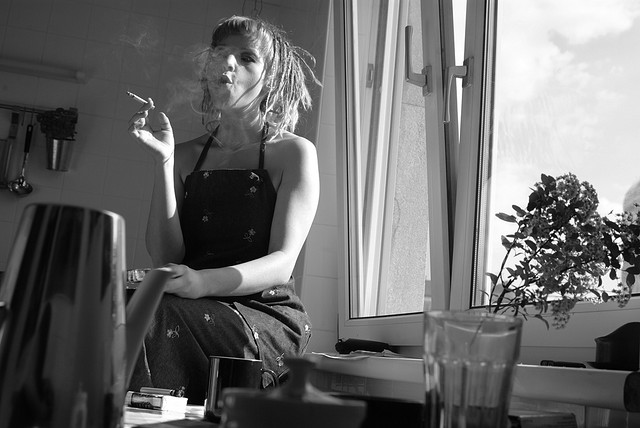I started smoking when I was 15.
Rather, I was 15 when I started experimenting with the half-smoked Marlboro menthol lights that were sitting in dozens in our patio ashtrays. I was 16 when I started sneaking them from my mom’s pack when it was nearly full (when she still might not notice that I had taken them), and I was 17 when I started taking full packs from her refrigerated cartons right after we brought them home from Costco.
They actually weren’t that appealing to me at first. They were dirty and hot and stinky. They required tutelage from my friends about proper ways to hold, flick and inhale them.
But they felt good, which is why I kept up the chase.
The way my mind was jig-sawed together made cigarettes a possible connection, but not just possible—adored, worshipped, glorified! Even the most amazing odes written to cigarettes could not have tapped into the gladness I experienced when I was smoking. They filled a void nothing else was filling, and over time it became obvious that cigarettes were satisfying my need to belong (or more accurately, my need to feel like I belonged).
During a period in my life when I didn’t want to spend time at school or at home, they were my connection to a life that actually felt worthwhile.
Isn’t that how addiction works?
As humans (or maybe mammals), we are designed to seek out good-feeling connections, and how we grab for them largely depends on our beliefs about who we are and what we deserve in life. These beliefs are invisible life-shifters, sneakily informing our desires and actions, until one day, smoking a cigarette in the morning before having sipped on water seems like the best and only thing to do. For inexplicable reasons, it just makes sense.
And all this from a girl whose parents always told her to never smoke! (In fact, they did such a good job, that my sister still embraces our childhood adage “the best way to quit is to never start!”. Unlike me, she has never smoked a cigarette and will likely be the one coughing if you’re the asshole smoking beside her on a perfectly open sidewalk.) But my parents spoke from the position of defeat (having spent the better part of three decades smoking half a pack of cigarettes a day themselves), and this is actually the part of the message that I found myself latching onto.
While my parents were begging me to stay away from their tar-covered path of nicotine addiction, I was hearing something completely different. I was hearing their feelings and mapping ideas of my own self-worth accordingly. Somehow, it came to be that I believed I deserved to become a smoker. By the time I picked up my first wrinkled mass of half-ashed cigarette stub, I had already decided that becoming a smoker was unavoidable whether I wanted it or not. Again, for inexplicable reasons, it just made sense.
The human mind is silly this way—it uses its conditioned belief systems to puppet us, so that while one kid wakes up with a basketball in hand eager to practice, and another kid wakes up drunk, both are looking for the same things in life and neither of them knows why they’re doing what they’re doing. All they know is that when the one plays ball and the other gets drunk, they feel like they belong exactly as they are (and that is what we are designed to seek more of).
During my ten-year affair with cigarettes, I made the decision to quit about half-a-dozen times.
This started around year six or seven, when smoking really lost its glamour. I started noticing how bad I smelled pretty much all of the time; I loaded my car with spritzers, lotions and cleansers—anything to make me smell like a flower instead of an ashtray; I had two kinds of people in my life: those who knew that I smoked, and those who didn’t; I started asking the question: am I comfortable actively contributing to disease in my body?
And this is when I would sit myself down (usually with a cigarette), and very firmly lecture myself on the new rules of my habit:
Brentan, you are quitting cigarettes. They are bad for you, and you know you can’t do this forever, so you may as well stop now. I will give you a few exceptions to this rule to make you more comfortable in the transition: you are, of course, allowed to finish this pack, because wasting it would be like throwing away four dollars, and that’s psychotic. After this pack is finished, that’s it! You’re done! But if you really need to, you can smoke one if you bum it from someone else, but only one a day. If you’re drunk, you can have three. And absolutely no smoking before dark!
There were times I actually kept to this rule. I even managed to go through several six-month periods of cigarette-free living. And during these stretches, it seemed so successful! I made declarations to my loved ones, purged all cigarette gear from my life, and stopped letting friends smoke in my car. There were times that I “quit” that it seemed like it would stick for good, that my residual pining for cigarettes would naturally wane with time, and in a few years, I would find myself a content ex-smoker who never dreamed of smoking another cigarette a day in her life!
But the pining didn’t soften. It actually intensified.
When I saw smokers walking down the street, I followed in their drag, pulling myself through nicotine clouds and gaping at them like a fish returning to water. I battled with cravings, which were stirred by any number of things—mood, time of day, temperature, activity, you name it. I had unknowingly talked myself into cigarettes when I was 15 years old, and now I was trying to talk myself down, the same way you might try to shove a stubbornly upright jack-in-the-box back in his vestibule.
What I didn’t realize is that quitting is not a series of actions, it’s a mentality, which I was desperately trying to imitate, but that ultimately wasn’t working. This is why the relapse always feels so normal, so run-of-the-mill, so much like coming home. It is, in a way, realigning actions and thoughts—I mean, which is worse? Smoking everyday, or daydreaming of smoking everyday? After experiencing the latter, I would argue that it’s pretty much the same thing.
After six months of pining for cigarettes (and denying them), there inevitably comes the day when I walk into a 7-11 and stare-down the cigarette counter, juiced-up at the mouth like a hungry jungle cat, and ask myself: what’s the worst that can happen? My thoughts split sides and join forces, until I arrive at the feeling that always settles the bet: what feels best to me right now? Five minutes later and I have packed, unwrapped and de-boxed my new prize, jumpstarting another two years of round-the-clock smoking, followed by another declaration of quitting, followed by another ill-fated attempt, followed by cigarettes.
As humans (or maybe mammals), when we’re addicted, quitting is never a one-stop shop. There are periods of intermittent freedom from addiction, followed by even more subservience. The declaration of quitting is nice (and a step in the right direction), but it doesn’t work (at least not directly or right away). This is because it creates two inner voices: one that says, “I want a cigarette right now!” and one that says, “You can’t have one!” There is no internal consensus or peace or understanding. (But you know where there is consensus, peace and understanding? Right after the first inhale, when the thumb is still warm from the lighter wheel, and all feels right with the world.)
So how has it now been two years since my last cigarette? And moreover, how is it that I don’t think about them very much? And still moreover, how is it that I don’t even want one?
The short answer is: I don’t know.
The long answer is, it felt different from the start. After my failed efforts at quitting, I grew tired of the fight. I grew tired of imposing rules on myself that seemed so rigid and unkind, so uncaring about my love for cigarettes (as any parent knows whose tried to keep their kids away from something they love, it just isn’t going to happen). So I didn’t quit. I agreed to one baby-step of change, something that felt good and non-threatening: to stop carrying cigarettes on me.
I took them out of my car, my purses and jackets, and put them in the freezer (in plain sight), where they sat for a few months. Friends told me I should throw them away or flush them down the toilet so I wouldn’t have an easy opportunity in moments of weakness, but that wasn’t the point. I actually gave myself full permission to smoke as much as I wanted, whenever I wanted. I’d even sometimes walk over to the freezer, open the door and stare at the pack, just to see what would happen.
But more and more, I started to close the door without taking one. I was no longer denying myself cigarettes in a mental game of tug-of-war, I was actually losing the desire. All of a sudden, not smoking cigarettes didn’t feel like a compromise.
And this is how I found out that life is actually quite ironic–because quitting only became possible when I dropped my agenda to quit.
This is why it doesn’t feel like I quit anything. Rather, it feels like cigarettes faded out of my life, like a friendship that dissolves when the commonalities go.
In my ten years of smoking, I graduated high school and college, I lived on my own in six apartments and two cities, I fell in love with boys and passions, I paid bills and joined the workforce. I can credit any of those things for helping me establish good-feeling connections apart from my tasty little friends, but I think what ultimately created the shift was the realization that happiness does not exist in an object—not in friends or boys or jobs or cigarettes.
Nonetheless, this is the happiness I was looking for when I was 15 and grabbed for my mom’s patio ashtray. This is what the basketball kid is looking for and what the drunk kid is looking for. We just have different methods of going after it.
When I experienced this happiness as a 17-year-old puffing away, I attributed it to cigarettes, but I could have realized then that cigarettes were merely an open gateway to a happiness that is always there. Instead, it took me several thousand cigarettes for me to realize it (and I don’t think I’m in charge of when that realization occurred, either).
The beauty of freewill is that we are allowed to smoke as many cigarettes as we want to. We are allowed to learn or ignore our lessons, and we are allowed total freedom and forgiveness for our choices. Those are the terms of The Universe.
Now we get to choose what our terms are.
More from Brentan:
The last time a Cigarette Made Sense to Me Was a Month Ago.
Let’s Remember This When We’re Hurting.
Relephant favourites:
The Wisdom of Addiction.
The Surprising Method that Helped me Quit Smoking.
Author: Brentan Schellenbach
Editor: Renée Picard
Image: ella propella at Flickr









Read 1 comment and reply